

fBI can activate laptop camera. Reasonable suspicion of criminal activity needed. Forcing to decrypt HD illegal. Feds urge court to reject laptop encryption appeal. The government is urging a federal appeals court not to entertain an appeal from a bank-fraud defendant who has been ordered to decrypt her laptop so its contents can be used in her criminal case.
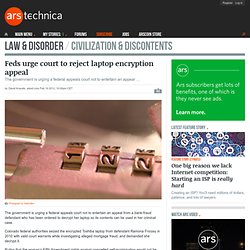
Colorado federal authorities seized the encrypted Toshiba laptop from defendant Ramona Fricosu in 2010 with valid court warrants while investigating alleged mortgage fraud, and demanded she decrypt it. Ruling that the woman’s Fifth Amendment rights against compelled self-incrimination would not be breached, US District Judge Robert Blackburn ordered the woman in January to decrypt the laptop by the end of February. RIP Act Part III - ORG Wiki. Regulation of Investigatory Powers Act 2000 part III (RIPA 3) gives the UK power to police forces to compel the disclosure of encryption keys or decryption of encrypted data by way of a Section 49 Notice.
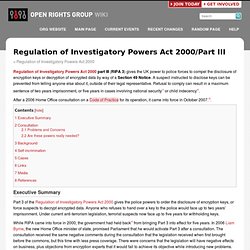
A suspect instructed to disclose keys can be prevented from telling anyone else about it, outside of their legal representative. Refusal to comply can result in a maximum sentence of two years imprisonment, or five years in cases involving national security[1] or child indecency[2]. After a 2006 Home Office consultation on a Code of Practice for its operation, it came into force in October 2007.[3]. Executive Summary. UK Man Jailed for Not Divulging PGP Encryption Password to Investigators – RIPA Part III Section 49. A UK man, said to be a schizophrenic, has been jailed for not divulging to police investigators the PGP encryption password to his computer.
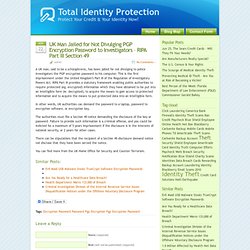
This is the first imprisonment under the United Kingdom’s Part III of the Regulation of Investigatory Powers Act. RIPA Part III provides a statutory framework enabling public authorities to require protected (eg. encrypted) information which they have obtained to be put into an intelligible form (ie. decrypted), to acquire the means to gain access to protected information and to acquire the means to put protected data into an intelligible form. In other words, UK authorities can demand the password to a laptop, password to encryption software, or encryption key. The authorities must file a Section 49 notice demanding the disclosure of the key or password. There can be stipulations that the recipient of a Section 49 disclosure demand notice not disclose that they have been served the notice. Similar Posts: Fourth Amendment Pragmatism. Laptop and Cell Phone Data Searched at Airport. Do our Fourth Amendment rights end at the airport?
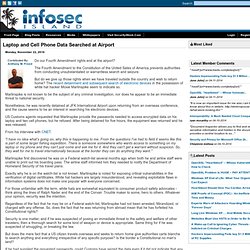
The Fourth Amendment to the Constitution of the United Sates of America prevents authorities from conducting unsubstantiated or warrantless search and seizure. But do we give up those rights when we have traveled outside the country and wish to return home? The recent detainment and subsequent search of electronic devices in the possession of white hat hacker Moxie Marlinspike seem to indicate so. Marlinspike is not known to be the subject of any criminal investigation, nor does he appear to be an immediate threat to national security. Nonetheless, he was recently detained at JFK International Airport upon returning from an overseas conference, and the cause seems to be an interest in searching his electronic devices. US Customs agents requested that Marlinspike provide the passwords needed to access encrypted data on his laptop and two cell phones, but he refused. From his interview with CNET: From his interview with Wired:
Laptops At The Gate: Why Old Search Law Doesn't Work. In one of its better articles, the ABA Journal posts about a "coalition of civil rights groups and criminal defense attorneys," including NACDL president-elect Lisa Wayne, suing the Department of Homeland Security over the search of laptop computers at the border.
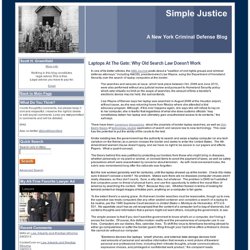
The searches and seizures at issue, which took place between Oct. 2008 and June 2010, were also performed without any judicial review and pursuant to Homeland Security policy which sets virtually no limit on the scope of searches, the amount of time a traveler's electronic device may be held, the suit contends. Lisa Wayne of Denver says her laptop was searched in August 2008 at the Houston airport, without cause, as she was returning home from Mexico where she attended a trial advocacy program. There have been numerous discussions about the propriety of border laptop searches, as well as Orin Kerr's theory of technology neutral application of search and seizure law to new technology.